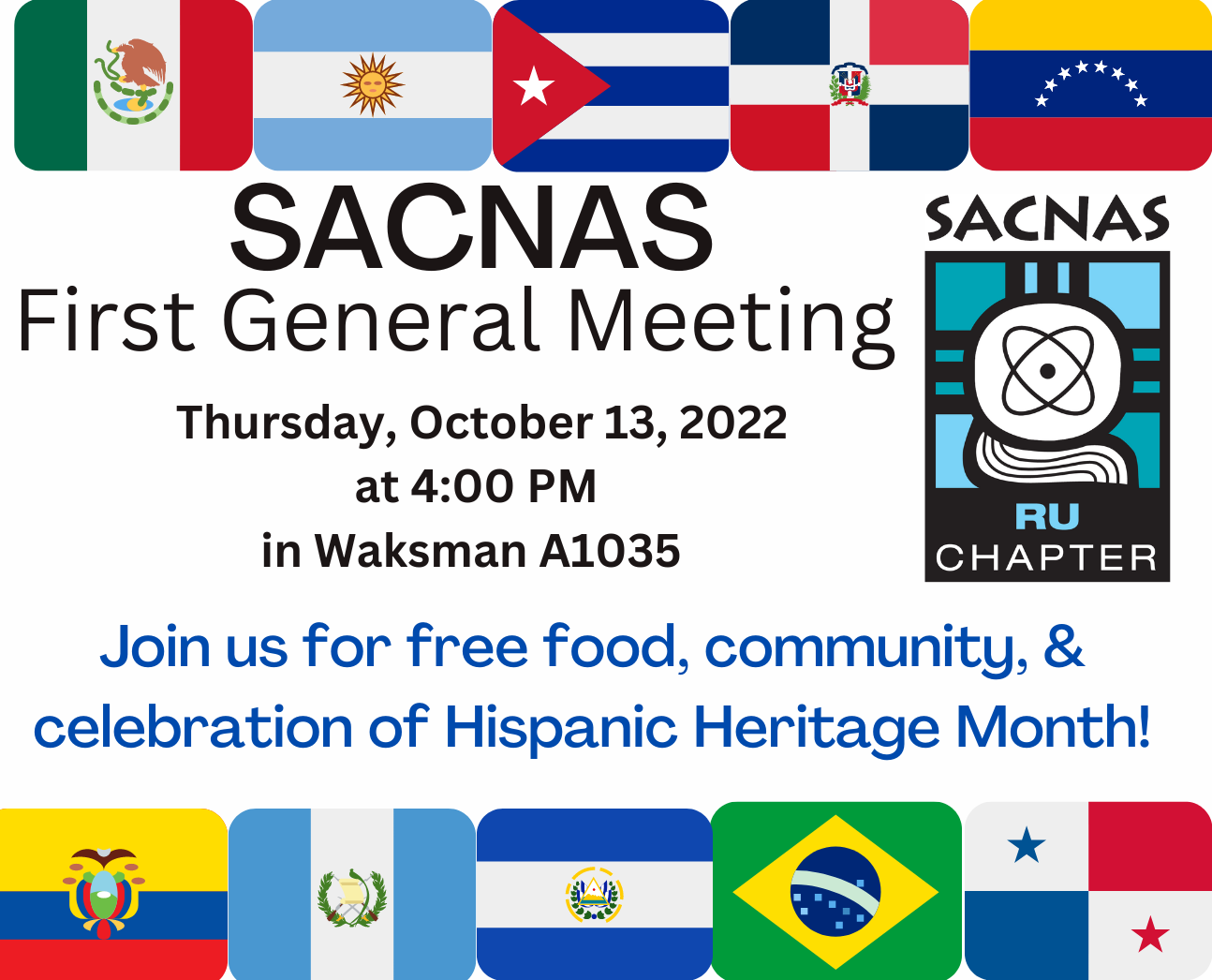Graduate Student Organizations
Event Description
Research Cafe: May 10, 2023
3:00 - 4:00pm
679 Hoes Lane, Piscataway, NJ 08854 (Room #10)
Center for Advanced Biotech and Medicine, Busch Campus
Zoom option available.
~Snacks & coffee provided!~
Register to attend in person or on Zoom.
Students, faculty, and staff are invited to join the School of Graduate Studies as we enjoy, dialogue about, and learn from two fantastic graduate students -- Parameshwaran Pasupathy (Ph.D. student, Mechanical & Aerospace Engineering) and Mary Lally (Ph.D. student, Microbiology and Molecular Genetics) -- who will share their research in a friendly and low-stakes setting. Learn more about the presenters and their presentations below!
---
1.) "A Fractional Viscoelastic Model of the Axon in Brain White Matter" by Parameshwaran Pasupathy
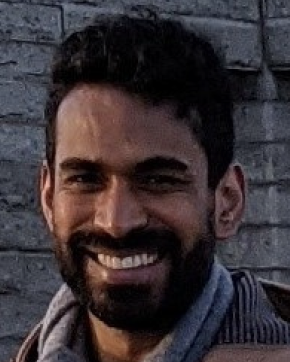
Abstract: Traumatic axonal injury occurs when loads experienced on the tissue-scale are transferred to the individual axons. Mechanical characterization of axon deformation especially under dynamic loads however is extremely difficult owing to their viscoelastic properties. The viscoelastic characterization of axon properties that are based on interpretation of results from in vivo brain Magnetic Resonance Elastography (MRE) are dependent on the specific frequencies used to generate shear waves with which measurements are made. In this study, we aim to develop a fractional viscoelastic model to characterize the time dependent behavior of the properties of the axons in a composite white matter (WM) model. The viscoelastic powerlaw behavior observed at the tissue level is assumed to exist across scales, from the continuum macroscopic level to that of the microstructural realm of the axons. The material parameters of the axons and glia are fitted to a springpot model. The 3D fractional viscoelastic springpot model is implemented within a finite element framework using a vectorized user defined material (VUMAT) subroutine in ABAQUS finite element software. Representative Volume Elements (RVE) of axons embedded in glia are developed and subjected to a relaxation displacement boundary condition. The homogenized orthotropic fractional material properties of the axon-matrix system as a function of the volume fraction of axons in the ECM are extracted by solving the inverse problem.
Presenter Bio: Parameshwaran Pasupathy is a 4th year PhD student at the Department of Mechanical and Aerospace Engineering. His dissertation is on the multi-scale modeling of brain tissue, which is at the intersection of mechanobiology, computational solid mechanics, and interfacial mechanics. His interdisciplinary research on micro-scale modeling of white matter seeks to develop a fundamental understanding of brain injury and its relevance in detecting mTBI (mild-Traumatic Brain Injury), which is currently undetectable by standard diagnostic tools (such as MRI and DTI.). Paramesh has a Masters degree in Aerospace Engineering from the University of Michigan. Prior to beginning his PhD at Rutgers, Paramesh worked as an Senior Technical Engineer for Siemens PLM as a part of their HEEDS multi-disciplinary design optimization team.
2.) "Dissociating the local and systemic effects of the non-absorbable antibiotic vancomycin" by Mary Lally
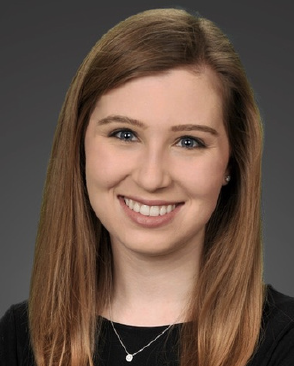
Abstract: Vancomycin is commonly prescribed to treat Clostridioides difficile infections (CDIs), yet even with antibiotic treatment, CDIs cause 15,000 deaths per year. Previous studies have investigated vancomycin's impact on the microbiome and antibiotic resistance; however, none have differentiated between the antibiotic’s effects on the microbiome and on the host. When administered orally, vancomycin remains in the gut; it is neither absorbed nor metabolized. Since the microbiome has an important role in processing dietary fiber and training the immune system, vancomycin-induced changes likely affect the host’s ability to respond to infections and treatment. The long-term goal of this project is to elucidate the differences between local changes to the microbiome and systemic changes to the host induced by the non-absorbable antibiotic vancomycin. My hypothesis is that changes in the gut microbiota alter circulating factors like immune cells, lipids, and microbial metabolites to induce changes in host health. Understanding what alterations occur can eventually help counteract them to provide the best care for individuals with CDIs.
Presenter Bio: Mary Lally is a second year graduate student in the Microbiology and Molecular Genetics Program and works in Dr. Martin Blaser’s laboratory. She earned a B.S. in Biological Sciences in 2020 and M.S. in Cell and Molecular Biology in 2021 from Fordham University. Mary first became interested in the microbiome when she was an undergraduate student and studied the salamander skin microbiome. She researched how bacteria living on a salamander’s skin protect the amphibians from the deadly chytrid fungus. Now, Mary researches the impact of antibiotics on the mammalian microbiome and its host and hopes that her work will improve outcomes and care for patients that receive antibiotic treatment.
About Research Cafe
Research Café brings together the entire graduate student community of Rutgers University-New Brunswick/Piscataway campus to strengthen scholarly literacy and interdisciplinary research communication by providing a platform for budding researchers to connect, share their in-progress research or scholarship, and benefit from peer feedback in a friendly and low-stakes setting.
Research Café is a monthly, one-hour event to occur at rotating locations across the Rutgers New Brunswick/Piscataway campus (a Zoom option will be available, too). Each event will feature:
- Presentations (10-12 min. each) from two graduate students from across disciplinary areas ranging from engineering and biology to history and anthropology.
- A Q&A dialogue with peers and attendees.
- Conversational time over refreshments and snacks.
Sign up to attend in person or on Zoom at https://grad.rutgers.edu/research-cafe.
---
Questions? Contact the program coordinators:
Sonal Gahlawat at sg1389@scarletmail.rutgers.edu, Briana Bivens at bb770@grad.rutgers.edu, and Ramazan Güngör at rg835@grad.rutgers.edu.
Research Cafe: Natalie Losada & Souvik Mandal
More Information
Learn more about the Research Cafe series.Event Description
Research Cafe: April 26, 2023
3:00 - 4:00pm
679 Hoes Lane, Piscataway, NJ 08854 (Room #10)
Center for Advanced Biotech and Medicine, Busch Campus
Zoom option available.
~Snacks & coffee provided!~
Register to attend in person or on Zoom.
Students, faculty, and staff are invited to join the School of Graduate Studies as we enjoy, dialogue about, and learn from two fantastic graduate students -- Natalie Losada (Ph.D. student, Chemistry & Chemical Biology) and Souvik Mandal (Ph.D. student, Chemistry and Chemical Biology) -- who will share their research in a friendly and low-stakes setting. Learn more about the presenters and their presentations below!
---
1.) "HIV‑1 gp120 Antagonists Also Inhibit HIV‑1 Reverse Transcriptase by Bridging the NNRTI and NRTI Sites" by Natalie Losada
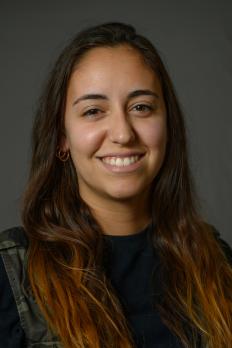
Abstract: HIV-1 infection is typically treated using ≥2 drugs, including at least one HIV-1 reverse transcriptase (RT) inhibitor. Drugs targeting RT comprise nucleos(t)ide RT inhibitors (NRTIs) and nonnucleoside RT inhibitors (NNRTIs). NRTI-triphosphates bind at the polymerase active site and, following incorporation, inhibit DNA elongation. NNRTIs bind at an allosteric pocket ∼10 Å away from the polymerase active site. This study focuses on compounds (“NBD derivatives”) originally developed to bind to HIV-1 gp120, some of which inhibit RT. We have determined crystal structures of three NBD compounds in complex with HIV-1 RT, correlating with RT enzyme inhibition and antiviral activity, to develop structure−activity relationships. Intriguingly, these compounds bridge the dNTP and NNRTI-binding sites and inhibit the polymerase activity of RT in the enzymatic assays (IC50 < 5 μM). Two of the lead compounds, NBD-14189 and NBD-14270, show potent antiviral activity (EC50 < 200 nM), and NBD-14270 shows low cytotoxicity (CC50 > 100 μM). ------TAKEN FROM::: J. Med. Chem. 2021, 64, 22, 16530–16540
Presenter Bio: I earned my bachelors in Chemistry from Rutgers in 2018 with a minor in Visual Art. Right after I went into my PhD program, once again in the Rutgers Chemistry department. I am now a 5th year PhD candidate in Eddy Arnold's lab group in the Center for Advanced Biotechnology and Medicine and Department, where I mainly use a technique called X-ray crystallography. I study the structures and mechanisms of interaction of HIV-1 proteins, such as reverse transcriptase, for potential drug development.
2.) "Ammonia and Beyond" by Souvik Mandal
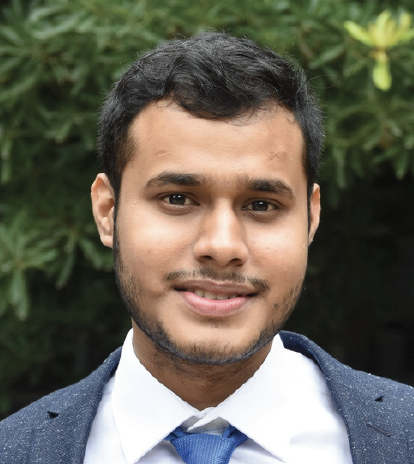
Abstract: One of the most important technological inventions of the 20th century is the Haber-Bosch process (HB) for the synthesis of ammonia from atmospheric N2. However, HB is responsible for ca. 2% of global fossil fuel consumption and the co-production of commensurate quantities of CO2. In this context, we are investigating molecular catalysts with the ultimate goal of developing electrocatalysts for the reduction of N2 to ammonia. Reduction of N2 using molecular catalysts has gained significant attention since Schrock’s seminal report in 2003 and then a report by Nishibayashi in 2011. We have centered our approach on metal complexes that can bind and cleave N2 via a bimetallic pathway, and then accept protons and electrons to yield NH3. The Nishibayashi catalysts have been proposed, at least in some cases, to operate via dinitrogen-bridging Mo(I) (d5) fragments. Recent work by Schneider et al. demonstrates dinitrogen cleavage by Mo(II) (d4) fragments although the system failed to catalytically produce ammonia.
We are currently investigating the catalytic N2 reduction using a PNP-pincer-ligated Mo complex (PNP = Ozerov’s diaryl-based pincer ligand) and, in particular, the cleavage of the dinitrogen-bridged species, using electrochemical methods.
Presenter Bio: I am Souvik Mandal, a 4th year Ph.D. candidate in Prof. Alan Goldman's group in the Department of Chemistry and Chemical Biology at Rutgers University-New Brunswick. I have completed my B.Sc(Research) and M.Sc from the Indian Institute of Science, Bangalore, India in 2019 and joined Ph.D. program. I am interested in the activation and functionalization of small molecules utilizing homogenous metal complexes. In particular, currently, I am working on nitrogen activation to make ammonia, which is used as fertilizer. In this talk, I will share my understanding and our efforts for it. Outside the lab, I like to cook, travel and visit National Parks.
About Research Cafe
Research Café brings together the entire graduate student community of Rutgers University-New Brunswick/Piscataway campus to strengthen scholarly literacy and interdisciplinary research communication by providing a platform for budding researchers to connect, share their in-progress research or scholarship, and benefit from peer feedback in a friendly and low-stakes setting.
Research Café is a monthly, one-hour event to occur at rotating locations across the Rutgers New Brunswick/Piscataway campus (a Zoom option will be available, too). Each event will feature:
- Presentations (10-12 min. each) from two graduate students from across disciplinary areas ranging from engineering and biology to history and anthropology.
- A Q&A dialogue with peers and attendees.
- Conversational time over refreshments and snacks.
Sign up to attend in person or on Zoom at https://grad.rutgers.edu/research-cafe.
---
Questions? Contact the program coordinators:
Sonal Gahlawat at sg1389@scarletmail.rutgers.edu, Briana Bivens at bb770@grad.rutgers.edu, and Ramazan Güngör at rg835@grad.rutgers.edu.
Research Cafe: Shawn Rumrill & Sergej Grunevski
More Information
Learn more about the Research Cafe series.Event Description
Research Cafe: March 8, 2023
3:00 - 4:00pm
679 Hoes Lane, Piscataway, NJ 08854 (Room #10)
Center for Advanced Biotech and Medicine, Busch Campus
Zoom option available.
~Snacks & coffee provided!~
Register to attend in person or on Zoom.
Students, faculty, and staff are invited to join the School of Graduate Studies as we enjoy, dialogue about, and learn from two fantastic graduate students -- Shawn Rumrill (Ph.D. student, Chemistry & Chemical Biology) and Sergej Grunevski (Ph.D. student, Cognitive Psychology) -- who will share their research in a friendly and low-stakes setting. Learn more about the presenters and their presentations below!
---
1.) "Structural implications of a second strand HIV-1 reverse transcription initiation complex +/- NNRTI for slow nucleotide incorporation and high sensitivity to NNRTI inhibition" by Shawn Rumrill
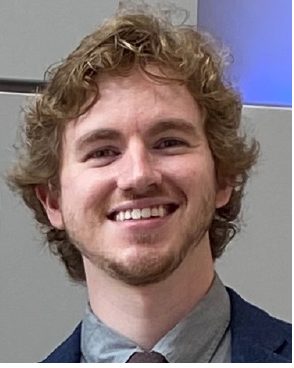
Abstract: A major target of antiretroviral therapy is the reverse transcriptase (RT) enzyme, which converts viral RNA into the DNA provirus, with nearly 50% of FDA approved HIV treatments targeting RT. Of these, non-nucleoside reverse transcriptase inhibitors (NNRTIs) are potent allosteric inhibitors of RT, but questions remain open about where and how they act in different stages of the viral lifecycle and reverse transcription. Biochemical studies have shown that plus-strand initiation of reverse transcription (initiating “second strand” DNA synthesis) is particularly sensitive to inhibition by NNRTIs, with more modest inhibition occurring in minus-strand synthesis. As such, our work investigates the structural features of a simplified plus-strand RT initiation complex (+miniRTIC) with and without an NNRTI (rilpivirine) to explore potential mechanisms that underlie these biochemical observations. Accordingly, we determined the first structure of HIV-1 RT with a DNA template and a polypurine tract RNA primer, representing the +0 state of plus-strand initiation. These structures provide new insights into the initiation state of RT, whereby the NNIBP more closely resembles an NNRTI-bound state, even in the absence of NNRTI, thus explaining increased susceptibility to inhibition. Further understanding of subsequent incorporation states may reveal new avenues for targeted therapy development.
Presenter Bio: Shawn Rumrill is a fifth-year Ph.D. candidate in the Department of Chemistry and Chemical Biology. Here, he uses biophysical techniques to understand the structure, function, and mechanisms of HIV and other proteins related to human health and disease. Outside of research, Shawn has a history of student involvement and leadership in organizations and student worker positions, include the Rutgers Graduate Student Association.
2.) "The dynamics of craving and willingness-to-pay for drugs and food in daily life" by Sergej Grunevski
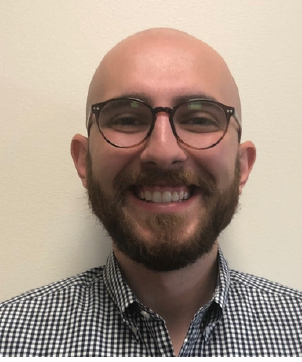
Abstract: Craving refers to the intense desire for a particular substance or activity. Many people experience healthy cravings for food and snacks, whereas others report excessively high craving for drugs that predisposes them to relapse. Recent laboratory studies show that craving may bias behavior by influencing subjective value: people are willing to pay more for craved items during the momentary state of craving. The purpose of the current study was to extend these findings outside the lab by repeatedly surveying daily craving and willingness-to-pay for drugs and snack foods via smartphones as healthy people and people with opioid use disorder engaged in their everyday lives. In this talk, I will discuss similarities and differences between person-level and moment (day)-level experiences of craving, as well as the relationship between craving and willingness-to-pay within and across commodities. Overall, the purpose of our work is to understand the timescale of association between craving and subjective value for drugs and food, how craving for a specific commodity may influence willingness-to-pay for another commodity, how these processes are influenced by drug use, exposure to drug cues, and mood, and how predictive they may be of future relapse.
Presenter Bio: Sergej Grunevski is a first-year Ph.D. student in Cognitive Psychology at Rutgers University-New Brunswick. His primary graduate mentor is Dr. Anna Konova, Assistant Professor of Psychiatry, whose main research focus is addiction & decision neuroscience. Prior to coming to Rutgers, Sergej received his B.S. in Behavioral Neuroscience at the University of Kansas and then worked as a research coordinator for three years at the Cofrin Logan Center for Addiction Research and Treatment under Drs. Richard Yi and Tim Pleskac.
About Research Cafe
Research Café brings together the entire graduate student community of Rutgers University-New Brunswick/Piscataway campus to strengthen scholarly literacy and interdisciplinary research communication by providing a platform for budding researchers to connect, share their in-progress research or scholarship, and benefit from peer feedback in a friendly and low-stakes setting.
Research Café is a monthly, one-hour event to occur at rotating locations across the Rutgers New Brunswick/Piscataway campus (a Zoom option will be available, too). Each event will feature:
- Presentations (10-12 min. each) from two graduate students from across disciplinary areas ranging from engineering and biology to history and anthropology.
- A Q&A dialogue with peers and attendees.
- Conversational time over refreshments and snacks.
Sign up to attend in person or on Zoom at https://grad.rutgers.edu/research-cafe.
---
Questions? Contact the program coordinators:
Sonal Gahlawat at sg1389@scarletmail.rutgers.edu, Briana Bivens at bb770@grad.rutgers.edu, and Ramazan Güngör at rg835@grad.rutgers.edu.
Research Cafe: Angeline Nies-Berger & Jamie Kwon
More Information
Learn more about the Research Cafe series.Event Description
Research Cafe: February 8, 2023
3:00 - 4:00pm
679 Hoes Lane, Piscataway, NJ 08854 (Room #10)
Center for Advanced Biotech and Medicine, Busch Campus
Zoom option available.
~Snacks & coffee provided!~
Register to attend in person or on Zoom.
Students, faculty, and staff are invited to join the School of Graduate Studies as we enjoy, dialogue about, and learn from two fantastic graduate students -- Angeline Nies-Berger (Ph.D. student, French) and Jamie Kwon (Ph.D. student, Planning & Public Policy) -- who will share their research in a friendly and low-stakes setting. Learn more about the presenters and their presentations below!
---
1.) "How can a neglected text of a 17th century female author inform current feminist practices?" by Angeline Nies-Berger
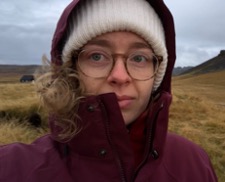
Abstract: I will present the ambition of my work: first, how it is significant for the field of 17th century studies, and in particular studies of Madeleine de Scudéry’s otherwise very famous works. Then, I will show why my analysis of this 17-th century text can help develop a feminist framework for analyzing contemporary material (whether textual or cinematographic).
Presenter Bio: After studying French Literature in France and starting my graduate-level studies in the USA in English, I finally found my way at Rutgers's French department. I am working on a 17th century text, "Les Femmes illustres" by Madeleine de Scudéry (1642), under Dr. Jennifer Tamas's mentorship. I intend to contribute to unearthing women's works of the Early Modern period (and before) to show that, contrary to what we usually believe, women always wrote. I also want to show what older texts can teach us about contemporary writing techniques, particularly the reappropriation of female representation in both literature and film.
2.) "Disability, traveling, and access to opportunities: The role of economic resources" by Jamie Kwon

Abstract: Many of the 44 million people with disabilities in the U.S. experience transportation challenges that hinder their ability to fully participate in society. While most studies focus on physical barriers to transportation (e.g., lack of wheelchair-accessible lifts at public transit stations), my dissertation explores how limited economic resources exacerbate physical barriers. I analyze data from nationwide time-use diaries to illustrate how disparate economic resources widen the travel gap between people with and without disabilities. I also interview people with disabilities to understand the benefits and challenges of purchasing a wheelchair-accessible modified vehicle. This research demonstrates how supportive economic policies can complement existing Americans with Disability Act requirements (e.g., installing sidewalk curb ramps). Specifically, my work will recommend changes to current grant programs for vehicle modification that will facilitate travel and increase access to jobs, healthcare, and other opportunities for people with disabilities.
Presenter Bio: Jamie Kwon is a disability and transportation researcher with a focus on poverty and access to privately owned wheelchair-accessible vehicles. She is currently a doctoral candidate at Bloustein School of Planning and Public Policy at Rutgers University. Her dissertation is supported by Howard Leventhal Scholarship at the Institute of Health, Health Care Policy, and Aging Research at Rutgers. Starting next March, she will be working at the Institute on Disability at the University of New Hampshire to continue her work on disability, access to private vehicles, and employment.
About Research Cafe
Research Café brings together the entire graduate student community of Rutgers University-New Brunswick/Piscataway campus to strengthen scholarly literacy and interdisciplinary research communication by providing a platform for budding researchers to connect, share their in-progress research or scholarship, and benefit from peer feedback in a friendly and low-stakes setting.
Research Café is a monthly, one-hour event to occur at rotating locations across the Rutgers New Brunswick/Piscataway campus (a Zoom option will be available, too). Each event will feature:
- Presentations (10-12 min. each) from two graduate students from across disciplinary areas ranging from engineering and biology to history and anthropology.
- A Q&A dialogue with peers and attendees.
- Conversational time over refreshments and snacks.
Sign up to attend in person or on Zoom at https://grad.rutgers.edu/research-cafe.
---
Questions? Contact the program coordinators:
Sonal Gahlawat at sg1389@scarletmail.rutgers.edu, Briana Bivens at bb770@grad.rutgers.edu, and Ramazan Güngör at rg835@grad.rutgers.edu.
Research Café
Event Description
Students, faculty, and staff are invited to join the School of Graduate Studies for our first Research Cafe gathering featuring two grad student scholars who will share their work and benefit from peer feedback in a friendly and low-stakes setting.
The first Research Cafe will be on Wednesday, Dec. 14 from 3:00-4:00pm in the Dean's Conference Room (#123) at the RWJMS Research Tower in Piscataway, NJ 08854.
Learn more and sign up to attend at go.rutgers.edu/researchcafe.
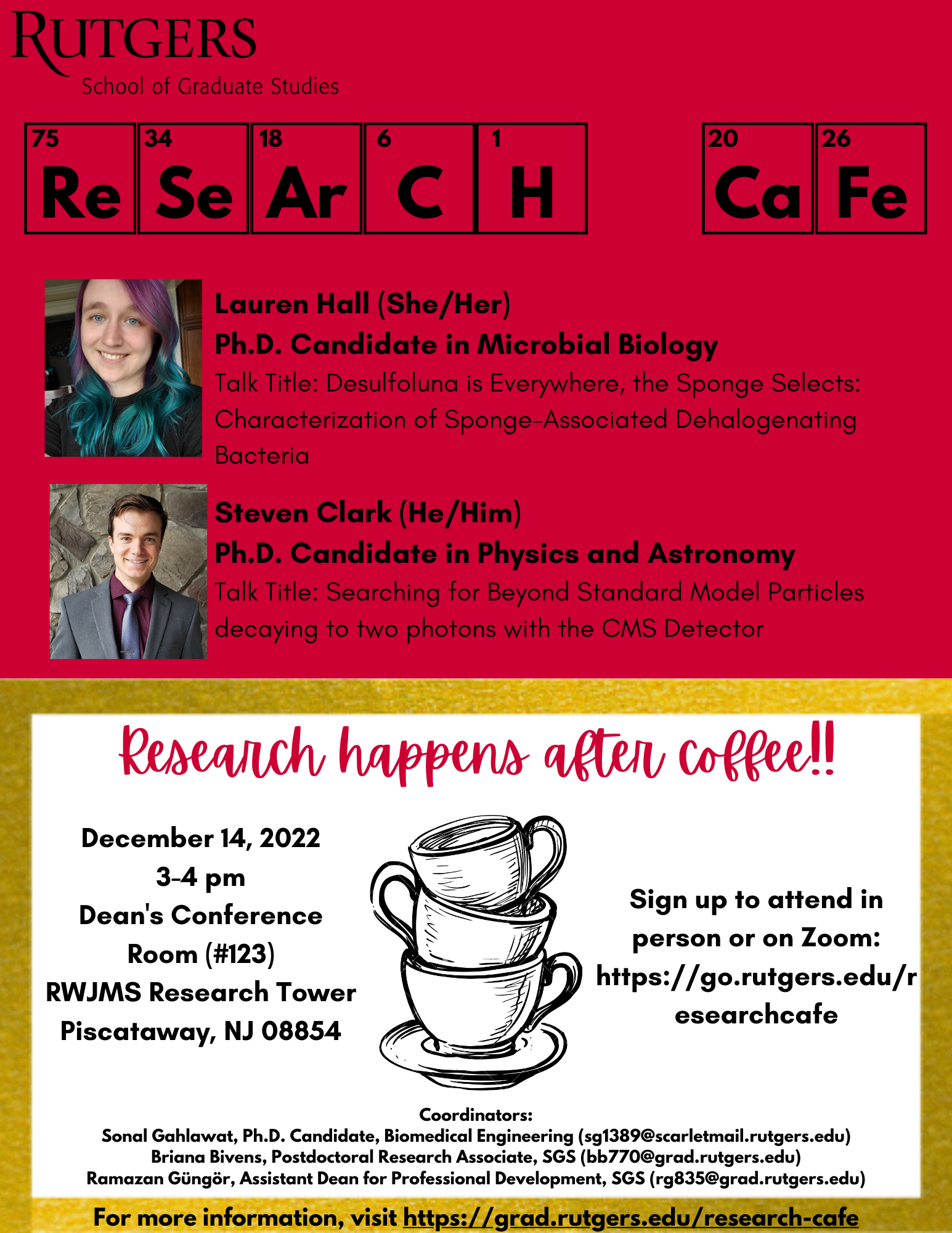
Featured Presentations
"Desulfoluna is Everywhere, the Sponge Selects: Characterization of Sponge-Associated Dehalogenating Bacteria" by Lauren Hall
Abstract: Organohalides are environmental contaminants resistant to degradation. The basic structure of organohalides is a carbon/hydrogen backbone with at least one carbon-halogen bond. Common manmade organohalides include brominated flame retardants, which are used in many industrial processes and household products. While many organohalides are manmade, thousands occur naturally. Marine sponges produce organohalide metabolites, often containing the element bromine, and are also hosts to rich microbial communities. We have postulated that these metabolites create a selective pressure promoting growth of bacteria that use the organohalide metabolites to their benefit.
Presenter Bio: Lauren Hall is a 4th year PhD candidate in the Microbial Biology program advised by Dr. Max Häggblom. She completed her bachelor’s degree in microbiology at Rutgers University and briefly worked as a technician in the molecular biology department of a clinical laboratory prior to graduate study. Her research interests include bioremediation of persistent contaminants and host-microbe biology. Marine sponges are a perfect intersection of these interests; her dissertation work focuses on degradation of brominated organic compounds by bacterial symbionts of sponges. Studying sponge-associated microbes with this metabolic capability may lead to development of new biodegradation methods utilizing sponges to do what they do best: filter. Her hobbies are also microbial in nature. Outside the lab, Lauren spends her time making lacto-fermented pickles and running a homebrew project with friends, “LAN NanoBrews”.
"Searching for Beyond Standard Model Particles decaying to two photons with the CMS Detector" by Steven Clark
Abstract: The Large Hadron Collider is the largest particle accelerator ever built. In 2012, the CMS and ATLAS experiments jointly discovered the Higgs Boson by analyzing proton-proton collisions from the LHC. This discovery makes searches for new beyond Standard Model Higgs-like particles possible. I will describe the search for one such particle decaying to final-state photons using the CMS detector. Specifically, I will discuss the use of novel Machine Learning algorithms to detect previously unresolvable two-photon objects. This analysis seeks to confirm the existence of the proposed new particle, paving the way for new theories beyond the Standard Model, or to set production limits.
Presenter Bio: Steven Clark is a Ph.D. student in the Physics department with an interest in Experimental Particle Physics. Steven is fortunate to work with data from the Large Hadron Collider at CERN in Geneva, Switzerland. When he is not researching, Steven enjoys running, biking and anything outdoors!
About Research Cafe
Research Cafe is a new student-organized initiative -- supported by the School of Graduate Studies -- designed to strengthen scholarly literacy and interdisciplinary research communication by providing a platform for emerging graduate student researchers to connect, share their in-progress research or scholarship, and benefit from peer feedback in a friendly and low-stakes setting.
The Research Cafe is scheduled to meet on the second Wednesday of each month (December 2022 and February-May 2023) at rotating locations across the New Brunswick/Piscataway campus, with a Zoom participation option. Each gathering will feature two stellar student presenters, Q&A/discussion time, and time to mingle and enjoy snacks.
Questions? Visit the Research Cafe website at https://grad.rutgers.edu/research-cafe or email Sonal Gahlawat at sg1389@scarletmail.rutgers.edu, Briana Bivens at bb770@grad.rutgers.edu, and Ramazan Güngör at rg835@grad.rutgers.edu.
SACNAS Graduate Chapter Kickoff with free food
Event Description
Join a dynamic community of graduate students in the sciences who support and promote the success of individuals from all backgrounds. Learn more about our Chapter at https://sites.rutgers.edu/sacnas/.
